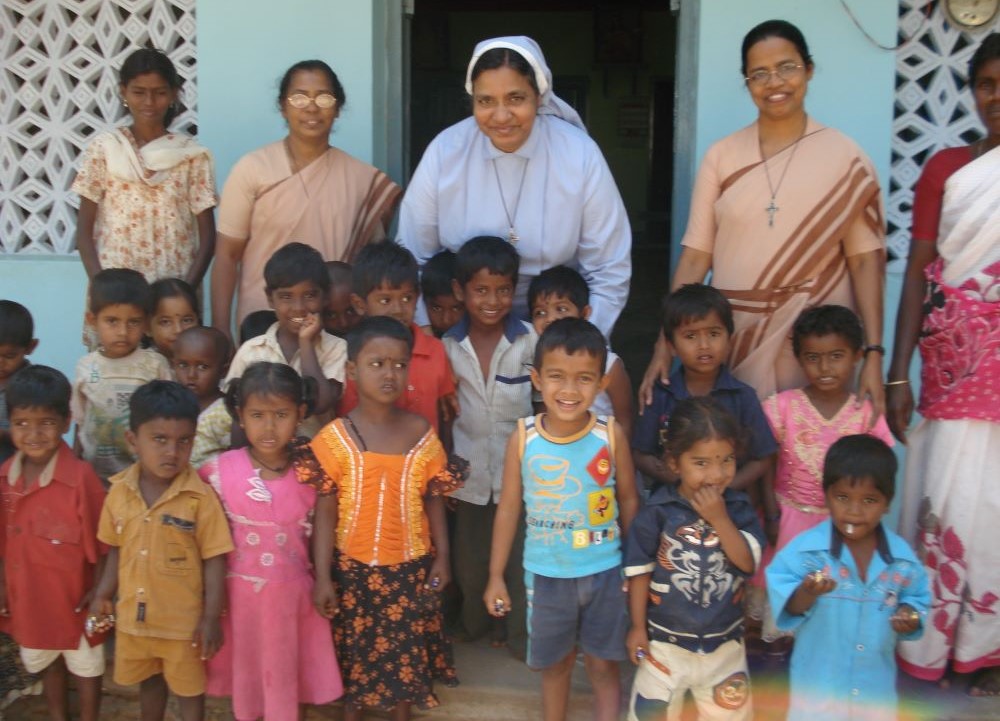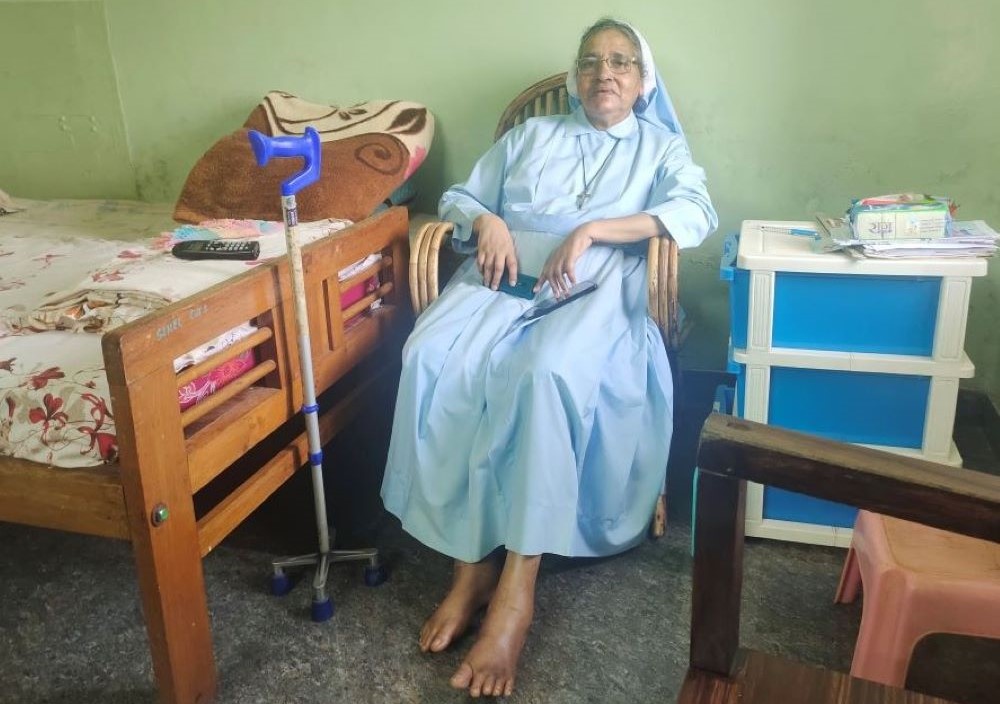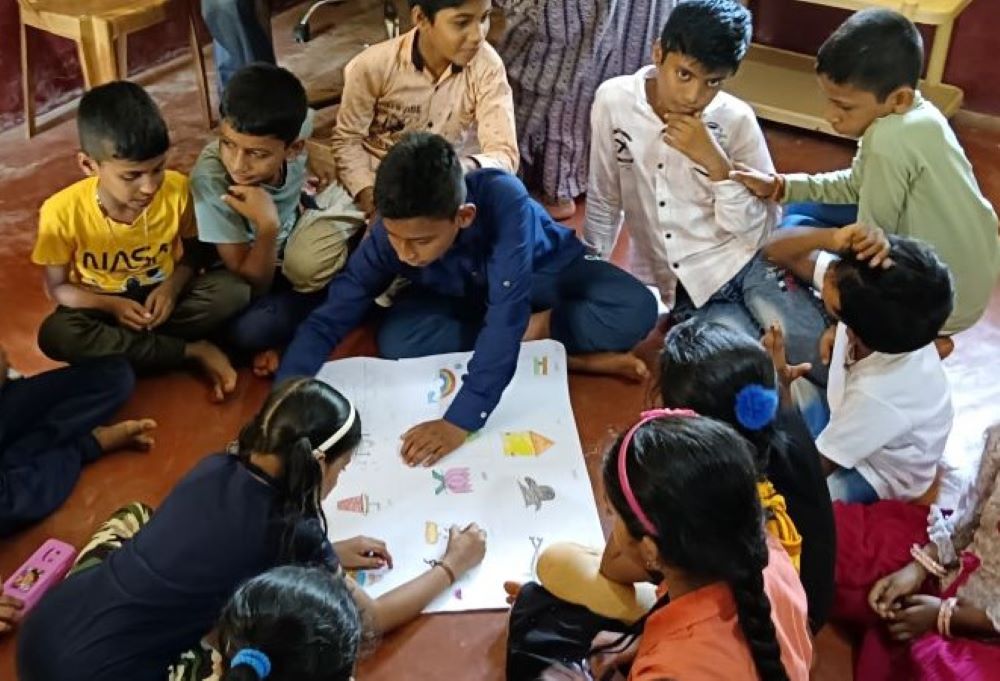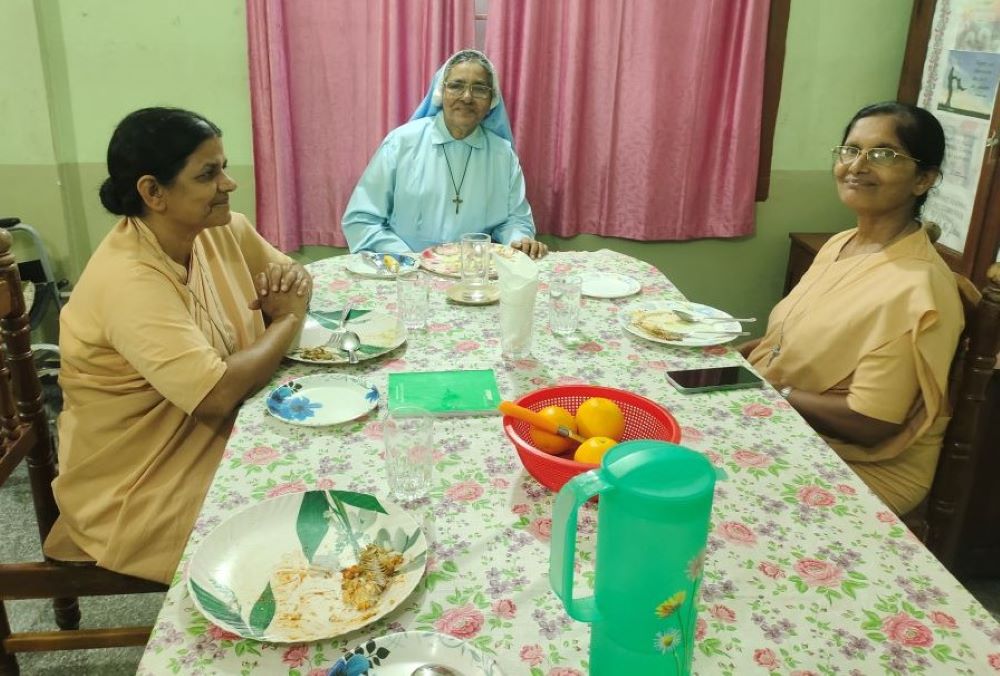
Sr. Maria Goretti (center, back row) and two Missionary Sisters of the Queen of Apostles stand with newly sponsored children from the migrant workers community. Through beneficiaries coordinated by the Dharma Jyothi Social Centre in Mangalore, India, the children will get an education. (Courtesy of Susai Antony)
Missionary Sisters of the Queen of Apostles Sr. Maria Goretti has managed a sponsorship program to educate poor children for the past three decades.
A road accident in 2018 has confined the 69-year-old nun to her room, but she continues running the program with the support of her former beneficiaries and project staff.
Goretti was the congregation's superior general 2006-12. The previous six years, she was the animator of Mangalore province.
In 1981, she founded the Dharma Jyothi (Light of Righteousness) Social Centre in Mangaluru and built about 750 homes for migrant laborers. She also initiated women and child development programs.
She has received several awards, including the All India Konkani Mahila Adhiveshan Award (1998), Sandesha Award (2000), the Gratias Agit Award from the Czech Republic (2004) and the Rachana Award for the outstanding woman of the year from the Catholic Chamber of Commerce and Industry, Mangalore in 2011.
Speaking to GSR at her office/bedroom in St. Ignatius Institute of Health and Education in Honnavar, a coastal town on the Karnataka-Goa border, Goretti shared her vision and mission.
GSR: How do you feel after being confined to your room?
Goretti: The accident has not made me inactive. I still work from my room. As the pandemic made many to "work from home," my accident has forced me to work from [my] room.
I still cater to over 1,500 children with their sponsorship programs. They study from grade 1 to master's degree level. Most live in their homes and study in various institutions. True, that I cannot go to them, but they come to me.
In my last 30 years of [the] sponsorship program, I have covered more than 5,000 children, especially girl children.
GSR: How did you develop your passion for children?
Goretti: I was born in an agriculture family in Kemmannu, a coastal village in the Udupi Diocese in 1955. My childhood playmates were mostly children from fishermen communities who hardly attended school because their parents could not afford their education. My parents could afford to send me to school. I always wanted to do something to help such people attend school.
When I grew up, I wanted to become a social worker. I joined my congregation as I had seen them serving the poor among the fishermen communities. Understanding my aptitude, my superiors sent me for social work education in Stella Maris College of Social Work in Chennai [southern India].
Later, they sent me to Coady Institute, Canada. In 1981, I started the Dharma Jyothi Social Centre in Mangalore and introduced the sponsorship program and housing for the migrant laborers, and introduced the sponsorship program for the children from poor families.

Missionary Sisters of the Queen of Apostles Sr. Maria Goretti manages a three-decade-old educational sponsorship program from her room in southwestern India. A road accident left her with a leg injury, and her room now also serves as her office. (Thomas Scaria)
GSR: How does the sponsorship program function?
Goretti: The sponsorship program is a linking program, a network, where the beneficiary and the benefactor are connected. We are just facilitators. I have a team of dedicated staff who carry out the daily activities. I continue as the director and coordinate their activities from my room which has been converted as my office.
The sponsored children write letters to the benefactors with study progress reports, wishes and dreams. I need a stick to walk. Similarly, the sponsoring family becomes a walking stick for our children to progress in life.
GSR: How is it different from other education support programs?
Goretti: Our program supports the children's total education until they get a job and settle down in life. Every child is assisted to study as long as she or he wants. The program is not supported by any funding agencies, but by individuals and families. So, all our 5,000-plus sponsored children have the same number of sponsors. On one side, it generates goodwill and on the other it leads to education and empowerment of the poor.
Funds from the European sponsors reduced substantially during the COVID-19 pandemic and it is then that local donors stepped in. Around 100 senior beneficiaries now support the scheme.
GSR: How do you ensure the children's education is job oriented?
Goretti: Our career guidance wing conducts aptitude tests, career counseling and helps children to choose the right course which can get them a job. Many are trained in health professions, some as teachers, engineers, and some in accountancy or technical fields. Currently, none of our sponsored children are unemployed.

Children work on a group project during summer camp, aimed at leadership building and social integration. The camp is run by the Dharma Jyothi Social Centre in Mangalore, India. (Courtesy of Susai Antony)
India ranks 86 among the world countries in unemployment. One reason for the unemployment among youth in India is because they do not choose job-oriented courses. We give great importance to the career chances of a sponsored child after he or she finishes education.
We also have produced some good vocations. Some sponsored children have become nuns, priests and missionaries.
GSR: How did you make the program sustainable?
Goretti: Our initial sponsors were ordinary people, who saved a part of their income to support poor children. Everything moved well until the pandemic happened in 2020. As the pandemic affected the economy, many sponsors could not keep their commitment.
It was then we sought the help of our former beneficiaries, who were already settled with jobs. Many offered to support as a thanksgiving gesture, which helped us to continue the program. Their support gives sustainability to the program.
GSR: How do you select your beneficiaries?
Goretti: Earlier, most sponsored children were from Catholic families. But today, we select children from all religions. The only criteria we follow is their economic status.
Most of our students are from families of single parents, widows, handicapped or families with more than four children. Most often, they are referred to us by civic bodies, or village committees. We make a background check with home visits before enrolling a student to the program, and take an assurance from the community leaders certifying their eligibility. We prefer admitting students who can stay with their families and study in schools rather than promoting hostel education.

Two Maria Bambina nuns share a meal with the Missionary Sisters of the Queen of Apostles Sr. Maria Goretti at her Ignatius convent in Honnavar, southwestern India. (Thomas Scaria)
GSR: What common programs do you have for them apart from supporting their studies?
Goretti: Once we accept a child, we cover their overall development — intellectual, emotional, spiritual and social well-being. So, we organize programs for them like summer camps, life skills training, farming, vocational training, exposure visits. Last year, we conducted six summer camps, covering more than 250 children with various personality and social development programs.
We also encourage the students to write letters and greetings to their sponsors on special occasions like Christmas, New Year and other festivals. In 2022-23, children wrote 3,246 letters during Christmas and Easter to the donors.
Advertisement
GSR: Apart from students, how do you address their family issues?
Goretti: We also cover the families of our sponsored children. The parents are involved in their children's education. They undergo various awareness and skills training sessions for their social and economic development. We celebrate Women's Day for mothers, organize health camps and workshops, organize self-help groups among them and encourage savings schemes.
Our congregation's nursing college regularly organizes community health camps for families and other children. Last year, 507 parents and 565 beneficiaries were covered in cluster wise follow up programs in 19 such community camps.
GSR: Please tell us about your vocation to the Queen of Apostles congregation.
Goretti: I wanted to become a nun to help the poor children. I thought a nun could do it selflessly. I never wanted to become a teacher nun, but a social worker to ensure every child gets equal opportunity to study. The pain I experienced noticing my friends not able to go to school was healed by dedicating my life for the cause of children.
My superiors gave me opportunities to study and develop my program among children. I think my vocation was more shaped by this passion for the cause of children than anything else.






